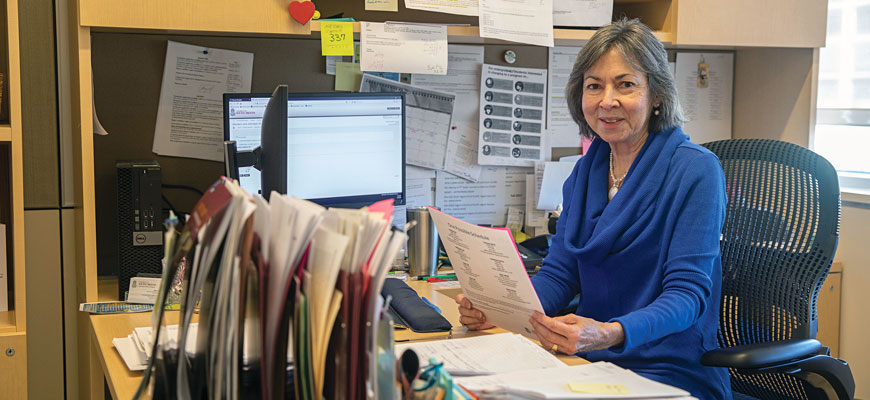
The Long Run: Libby Foreman
University employees with more than 4 decades under their belts reflect on their careers
Posted on: May 20, 2019; Updated on: May 20, 2019
By Page Ivey, pivey@mailbox.sc.edu, 803-777-3085
They arrived in the 1970s, some after serving in Vietnam, some fresh out of high school or college. More than 40 years later, they still come to work at the University of South Carolina — some after officially “retiring.”
“This is such a great place to work, people don’t want to leave,” says Caroline Agardy, vice president for Human Resources. “They’re proud to work for the University of South Carolina and dedicated to making higher education their life’s work.”
The workers who have committed their careers to the university agree. They stay because they like learning something new every day, helping young students find their way in an increasingly complicated world and interacting with co-workers who feel like family.
TIMES spoke with a few of these long-term employees to see what keeps them coming back to work on campus, long after they could have settled into that place in the mountains or that home by the sea.
From shorthand to the long haul
“This has been my life,” says Libby Foreman, associate director/academic adviser undergraduate division in the Darla Moore School of Business. “I don’t know how to do anything else.”
In 1971, Foreman and her husband, a Vietnam veteran, were living in student housing while he worked on a degree in civil engineering when she decided that perhaps she should find a job.
“I could type 80 words a minute and I could do shorthand,” Foreman says. “Frances Counts — she took care of the graduate students — was looking for someone who could take shorthand. George Reeves was head of the graduate school, and he hired me sight-unseen.”
That began her 36 years in the Graduate School, where she worked in various capacities.
“We just had this tight-knit group on campus. It didn’t even feel like work,” Foreman says. “I remember sitting on the Horseshoe one day and a couple of guys came streaking across there. Students have changed a lot.”
Along the way, Foreman earned a bachelor’s in interdisciplinary studies. “I started by taking English and history courses, then someone suggested I complete a BAIS. I really got to take whatever I wanted.”
After Foreman “retired” from the Graduate School, she took a three-day break, then came back and has spent the past dozen years at the business school.
“I wasn’t ready to retire,” she says. “I felt like I still had something to share.”
Instead of graduate students, she now works with freshmen. “Now these kids could be my grandkids. But it’s still exciting, seeing the growth in individual students. That’s a powerful thing to watch.”
Share this Story! Let friends in your social network know what you are reading about